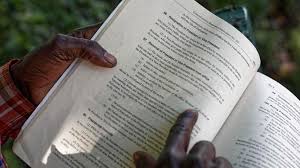The proposed amendments to the constitution are harmful to the country’s unity, as the Emmerson Mnangagwa led government is politicking, putting its primary interests above that of the people and the country`s development.
According to former state enterprise minister, Dr Gorden Moyo, Zimbabwe’s constitution adopted on March 22, 2013, united people, who put aside their political, religious, ethnic and cultural differences to usher in a new start.
Their primary interest was the country and the constitution itself, said Dr Moyo.
“The constitution was negotiated, discussed, as people were consulted from the four corners of the country. People voted in a referendum and 94.5 percent said they wanted the constitution, a decision made across the board, party lines, ethnic lines, religious lines and all lines that you can think off. This was at a time where the country was united, searching for another and each other,” he said at a public opinion space meeting held Wednesday to discuss the amendments.
“Now people are divided and angry unlike 2013, where there was a semblance of nationhood in the making. People wanted the constitution adopted, as it is a birth certificate of modern society in the country, a national, political and cultural glue of Zimbabwe. Now at a time when people are looking for solutions, you want to do destroy that which was done with a united purpose,” Dr Moyo said.
He added that this was an indication that there was something wrong with the government.
“You want to divide people and it shows there is something wrong in your head.”
Dr Moyo said the government should have prioritised the realignment of laws and infrastructural development not to waste resources amending the constitution.
“Go to other countries such as Ethiopia and Rwanda and see when people prioritise development and people. But here our prioritisation is power, look at delimitation to do with elections, appointments that give powers to the president. It’s not about infrastructural development or water sanitation but on who is going to be in power,” he said.
The former minister highlighted that such thinking is destructive, seen even in the type of amendments sought, giving an example of the removal of the running mate clause.
“Political leaders have a problem with succession and we decided that we must have a running mate to know who will lead next but they want to avoid it. This is dangerous and undemocratic. We didn’t need these amendments but for government to realign laws, deal with liquidity crunch, corruption first, rather than wasting time and money with amendments aimed at propping one to power,” Dr Moyo said.
Constitutional law expert, Professor Welshman Ncube, concurred saying it was worrisome that in a relatively short space of time, the country was already having a second amendment.
“We spent a lot of time with COPAC creating a new constitution, to which we all participated, putting values and principles that we hold dear. Therefore, we would then expect that any government will be very slow to start interfering with that.
“Since the end of the second world war, Japan has not amended its constitution not even once. In over 200 years, the American people have amended their constitution in just over two dozen times.”
Prof Ncube said citizens must stand up and defend the integrity of their constitution.
“This is not to suggest the constitution is a bible that its divine and can’t be changed. It was made by us human beings and bound to have mistakes, as there are provisions which prove unworkable and need change. That’s why there are provisions to change it but the changes must be wholesome.”
Lactricia Mumba, a lawyer, intimated that people must be worried and act to defend their constitution.
“You must question yourself why they are doing these amendments, putting them into law. It is important for people to remain vigilant and be engaged,” she said.

